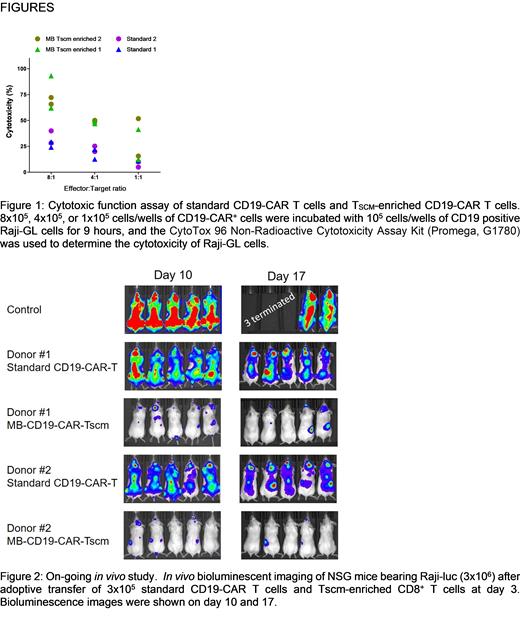Abstract
INTRODUCTION
Chimeric antigen receptor (CAR) T cell therapy provides a potential cure for patients who don't respond to standard treatments. One of the major challenges for current mainstream CAR-T therapy is lack of in vivo persistence of transferred cells. Intriguingly, more differentiated effector T cells that acquire enhanced in vitro anti-tumor properties were found to be paradoxically less effective for in vivo tumor treatment. It has become clear that the persistence of adoptive transferred T cells is crucial for in vivo activities. A significant linear correlation was found between the differentiation status of infused T cells and the potency of tumor regression, in the order of Tscm > Tcm >Tem. While promising, CAR-Tscm cell therapy demands technical innovation for precision cell processing and production. Here, we show CAR-Tscm cells generated by microbubble-based technologies for precision T cell sorting and activation and viral transduction are more robust than those generated by the conventional method in in vitro assays and in vivo animal study using the NSG mouse model.
METHODS
Naïve T cells were isolated by sequential sorting with 3 targeted lipid shell microbubbles (conjugated with anti-CD8, anti-CD45RA, and anti-CD62L). Briefly, CD8+ T cells were floated by anti-CD8 conjugated microbubbles and separated from nontargeted cells in PBMC. The floated CD8+ cells returned to solution after the microbubbles had undergone dissolution by increasing ambient pressure. These cells were subsequently floated by anti-CD45RA and anti-CD62L microbubbles sequentially, as described earlier. To generate CD19-CAR-modified Tscm-enriched cells, isolated naïve T cells were activated by anti-CD3/CD28 conjugated microbubbles and transduced by CD19-CAR retrovirus via Retronectin conjugated microbubbles. Transduced naïve T cells were cultured in media with IL-7, IL-21, and TWS119. Control CD19-CAR T cells were produced from same donors' PBMCs using standard culture conditions (soluble IL-2 and anti-CD3/CD28 coated culture flasks). Raji cells were co-cultured with effector cells (Tscm-enriched and standard CD19 CAR T cells) at a gradient ET ratio for in vitro cytotoxicity assay. Tscm-enriched and standard CD19-CAR T cells were injected into Raji-luc-bearing NSG mice. Tumor burden was measured by the XenogenIVIS system.
RESULTS
Naïve CD8+ T lymphocytes were enriched by sequential isolation of CD8+, CD62L+, and CD45RA+ cells from healthy donor PBMCs using respective antibody conjugated microbubbles. The CD8, CD62L, and CD45RA triple positive population was enriched from initial 10.08%± 2.4% to 71.84%±1.9% (n=4). We discovered that Retronectin conjugated microbubbles are advantageous to replace spinoculation technique to simplify viral transduction procedures. The average transduction efficiency was 27.71%± 8.7% using unconcentrated retroviral vectors. The Tscm-like cells were significantly enriched after two-week culture, compared to the standard method (37.78± 14.5% vs. 4.38± 0.7%). Tscm-enriched CD19-CAR T cells exhibited a stronger in vitro cytotoxicity towards Raji cells in comparison with standard CD19-CAR T cells (Figure 1). Consistently, in the NSG mice engrafted with Raji-Luc cancer cells, the CD19-CAR-modified Tscm-enriched cells showed longer-lasting antitumor responses than the CD19-CAR-T cells generated by the standard manufacturing process (Figure 2).
CONCLUSION
We have developed a bead-free, multi-positive selection system for CAR-Tscm production, and demonstrated that these Tscm cells effectively cause tumor regression and prolong diseased animal lifespan. A closed, automated, microbubble-based CAR-T cell manufacturing system, combining T cell isolation, activation, and transduction will be developed to improve performance and reduce costs.
Fu: Diagnologix LLC: Current Employment. Shi: Diagnologix LLC: Current Employment. Liu: Diagnologix LLC: Current Employment.


This feature is available to Subscribers Only
Sign In or Create an Account Close Modal